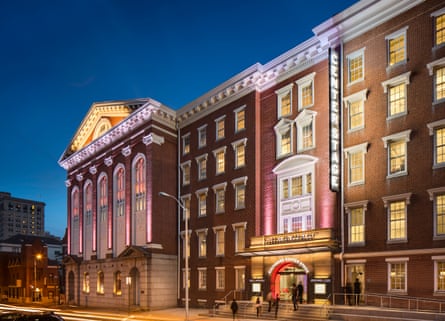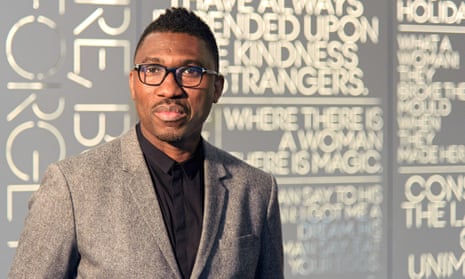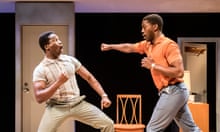As a Briton who has lived in America for six years, Kwame Kwei-Armah had a front row seat for the seismic political events of 2016.
“Brexit broke my heart,” the actor, director and writer admits by phone from Baltimore. “I was at home the day after Brexit, and I have to say the fear that I saw in the eyes of Europeans who were not born in Britain: I would ask and I would remember it was not so long ago that I felt afraid to walk the streets of London, that sense of being an outsider and being told you’re an outsider on a daily basis.
“I’m a pan-European kind of guy, I believe our strength lies in integration, it lies in open borders, it lies in anti-xenophobia. I was very pained by Brexit and saddened for the young who will have to fight to create another kind of inclusive environment when they come to power age.”
Kwei-Armah – who changed his name from Ian Roberts aged 19, having researched the family’s likely slave history – has been artistic director of the Baltimore Center Stage theatre since 2011. His past career in Britain included playing paramedic Finlay Newton in BBC hospital drama Casualty and writing a “triptych” of plays for the National Theatre in London, starting with Elmina’s Kitchen in 2003. Now 50, he is relishing what he describes as a “a golden age” of American theatre and shows no signs of returning home – but not for lack of affection.
“I love London, I love Britain. When I’m there I go, ‘My God, how did I leave?’ And then you get on the plane and you land and you’re in Baltimore and you go, ‘I love it here, I love it that life has allowed me these experiences’. I miss everything about London, even the bad things, but I love everything about Baltimore, even the bad things … It’s a fascinating time to be living in America.”
Indeed, after the bitter experience of Brexit, Kwei-Armah was on the ground to behold the election of Donald Trump. The celebrity businessman ran a populist campaign that demonised immigrants and, with figures such as Steve Bannon associated with the so-called “alt-right”, reawakened forces of white nationalism.
“I witnessed in my own life a kind of articulation of a time that I perceived had gone by. I heard and was party to conversations that were what the right might be rebelling against in terms of political correctness. I saw and personally received a level of commentary that I perceived the country had gone past, particularly when it extolled or investigated that America was in a kind of post-racial phase.”
Trump’s antics have provided a goldmine for journalists and late-night comedians such as Stephen Colbert and the cast of Saturday Night Live. Reader and viewer numbers have soared accordingly. It would not be a huge surprise if literature, visual arts and theatre experience a similar effect.
But Kwei-Armah takes a different view: “I think Barack Obama was great for art. It made America feel competitive again. After years of Bush, it made it feel confident again. It made it feel proud of its intellectuals because it had an intellectual in the White House. We have to mindful that art doesn’t fit in an opposition space just because it should. What art needs to do in this Trump era is allow society to really look at itself and really talk to why we find ourselves here.
“Though Hillary won the popular vote, a hell of a lot of people voted for Trump and as the opinion polls tells us, if one believes it, the overwhelming majority of people who voted for him are happy with him. So we also have to put that into consideration when we look after a whole community, not just a kind of liberal elite, though I do not say that in the pejorative.”

Kwei-Armah, for one, would be hard to write off as a member of the coastal-Hollywood-Broadway nexus that Trump and co like to bash. “Even though Maryland is a Democratic state – though we have a Republican governor – I don’t make the assumption that the majority of my subscribers lean to the progressive side. In fact I would probably say that’s not true. So therefore the challenge is a very interesting one because it feels like it could be really easy to go: ‘Oh, great, we could just do the equivalent of Saturday Night Live and all our subscribers would be happy’. Absolutely not, actually.”
The upcoming season at Baltimore Center Stage includes Skeleton Crew, a story of deindustrialisation and factory closures typical of the towns that propelled Trump to victory, and Animal Farm, George Orwell’s allegory tracing the betrayal of a political revolution.
Kwei-Armah ponders: “What new play can we write or produce about the rise of populist nationalism, or what can we produce about Trump in the White House and, far more, what classic play is there that speaks to this time and lets us know that we’ve been here before and these are the tools that we use in order to send ourselves to a better place? The role of theatre at this point is metaphor, is to take our form and help us reflect and find our way through wherever it is we find ourselves.”
Baltimore is again struggling to combat a rising murder rate and shrinking population, but the theatre is on the up, having recently undergone a $28m renovation and launched a mobile unit to serve groups such as the homeless, inmates and refugees. Plans for an annual free show in the park are under discussion.
“I’ve learned that there’s no such thing as one audience. There are multiple audiences and the job of an artistic director is to speak to each of those audiences specifically at some times and all of them at some times.”

Kwei-Armah is a black Briton succeeding in America at a time when Samuel L Jackson has criticized other black British actors for taking on too many American roles, aimed recently at Daniel Kaluuya starring in racially charged horror hit Get Out. “There are a lot of black British actors in these movies,” he said in March. “I tend to wonder what that movie would have been with an American brother who really feels that. Daniel grew up in a country where they’ve been interracial dating for a hundred years.”
Kwei-Armah, who grew up up in Southall in London, has his own perspective. “The beautiful thing about history is that it’s a circle and not a straight line,” he says. “I’m old enough, I have to confess, to have been an actor in Britain in the late eighties and certainly into the nineties when the absolute reverse happened in Britain. The American actors would come into Britain and they would take all the big roles, and most of the plays that were done about blackness in any form were American plays, not black British plays or Caribbean plays, and the American actor ruled the roost.”
He recalls the example of Denzel Washington, who played a British veteran of the Falklands war in the 1988 film For Queen and Country. “I remember us as young British actors feeling a sense of loss and a sense of pain that we were not being privileged in our own story. So I absolutely understand both sides of the coin. I remember what it was like then and I can be empathetic to how people feel now.”
For Kwei-Armah, as for many other Britons, America might be an ocean away but feels uniquely close, as last year’s one-two punch of Brexit and Trump illustrated. He muses: “I have lived on a diet of American culture all of my life and actually I feel that it is almost part of my own culture and therefore coming to America isn’t actually like coming to a foreign land and taking something’s that not mine. It’s actually a by product of the American entertainment export market and we’re just coming reflect that back, so I understand both sides of the argument.
“I’m sure in some way there are people saying why is this black Brit leading a major American institution, and I would have no argument with them saying that. On the flipside, I would say, look at the work that I’ve done and look at how I have served the narrative of the African American and the diasporic African during my time here.”







Comments (…)
Sign in or create your Guardian account to join the discussion